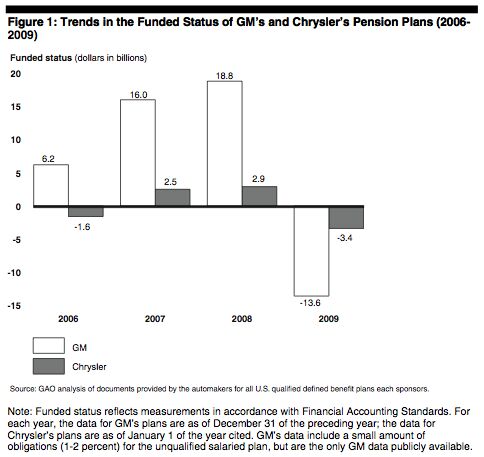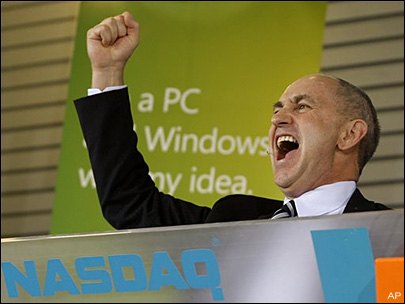#HighFinance
Did GM Lose Money Again In Q1?
Don’t ask Chairman/CEO Ed Whitacre. His only comments so far on GM’s Q1 2010 performance comes from a memo leaked to Reuters, in which he says:
In January, I said we could earn a profit in 2010, if everything falls into place. Our first quarter financial results will show us an important milestone, and I’m pleased to say that I anticipate solid operating results when we report our first quarter financials in May
“Important milestones”? “Solid operating results?” What the hell is Whitacre trying to say?GM Lost $4.3b In The Second Half Of 2009
GM has announced its “fresh-start” post-bankruptcy accounting results, and between July and December of last year, the bailed-out automaker lost $4.3b [press release here, full numbers here, in PDF format]. The loss comes despite $57.5b in global revenue, and $1b in “net cash provided by operating activities.” According to GM’s release:
The $4.3 billion net loss includes the pre-tax impact of a $2.6 billion settlement loss related to the UAW retiree medical plan and a $1.3 billion foreign currency re-measurement loss.
Of course, you have to dig into the numbers to find the bad news, like the $56.4b in “cost of sales,” or the $700m interest cost, or the 48 percent North American capacity utilization in 2009, or the 16.3 percent US car market share. Which is why we’ve included the consolidated statement of operations, consolidated balance sheets and more, for your no-download-necessary perusal, after the jump.
GAO: Pension Plans Will Kill Detroit. Again.
It would be impossible to blame Detroit’s decades-long decline on a single factor, but if one were to make a list, defined pension obligations to workers would be somewhere very near the top. Thanks in large part to the unionization of America’s auto industry, Detroit has groaned under the weight of crushing pension obligations since time immemorial. And, according to a new report by the Goveernment Accountability Office [ full report in PDF format available here], last year’s bailout of GM and Chrysler has not eliminated the existential threat that these obligations pose to the industry. In fact, the taxpayer’s “investment” in GM and Chrysler appears only to have exposed the public to even an greater risk of catastrophic pension plan failure.
GM Will Miss Financial Results Filing Deadline
With GM And Chrysler IPOs AWOL, VEBA Auctions Ford Stock Warrants
The UAW’s VEBA health care trust fund currently owns 17.5 percent of GM and 55 percent of Chrysler, but with IPO plans still nebulous at both, the fund is short on options for improving cash flow. Remember, the union doesn’t want to own these companies… it would have preferred cash, thanks. But since bailout negotiations allowed the automakers to fund their VEBA obligations with stock and warrants, VEBA has little choice but to monetize them. And while GM and Chrysler limp towards an eventual IPO, VEBA’s 362.4m Ford stock warrants are actually doing pretty well relative to their $9.20 exercise price. So it’s no huge surprise to hear [via Automotive News [sub]] that VEBA is planning on dumping its entire allotment of Ford warrants, in a move that could be worth “at least” $1.27b. And it’s no coincidence that this news comes on the same day that Ford is announcing a $3b debt prepayment, and the day after its sold Volvo to Geely for $1.8b.
Pentagon Backs Dealer Finance Regulation,
Funny or Die’s Presidential Reunion from Will Ferrell
Remember when we reported that the cash cow known as in-house dealer finance wouldn’t be covered by the Consumer Financial Protection Act, currently making its way through congressional committees? That version of the bill passed the House Financial Services Committee (with some questionable support), but now Automotive News [sub] reports that the Senate Banking Committee has passed its own version which does make dealer finance subject to regulation by the Consumer Financial Protection Bureau. The Senate version would also make the CFPB an office of the Federal Reserve, rather than a stand-alone agency. So, should an agency set up to prevent another financial crisis extend regulation to dealer finance operations? Dealers aren’t happy about the idea, but traditional consumer advocates aren’t the only ones saying yes…
Quote Of The Day: Old Lines From New Faces Edition
GM, GMAC Go Their Own Ways
In their latest report, the Congressional Oversight Panel suggested that GM’s formerly captive finance arm GMAC shouldn’t have been split from the automaker it still supports. If this led you to believe that GM would take the troubled finance firm back under its corporate wing, you have another thought coming. The WSJ [sub] reports that
The idea appealed to GM, in part because auto maker would have more control over lending practices. GMAC’s move in 2008 to dramatically restrict leasing amid the U.S. financial crisis helped trigger the spiral that sent GM into bankruptcy the last year… But taking over GMAC would have many complications. GM sold a majority stake in GMAC in 2006 as a way to buck up the auto maker’s credit standing and its access to capital. As it turned out, GM still remains largely cut off from the markets.
BYD Charges Ahead
Chinese battery maker and aspiring automaker BYD earned $215m in the fourth quarter of 2009, bringing its net profit for last year to $555.2m, reports Automotive News [sub]. BYD’s performance outstripped analyst estimates, which projected fourth quarter profits of $130.5m, and full-year profits of $473.2m. Though the Chinese auto market grew 46 percent to 1.6m vehicles, 47 percent of BYD’s 2009 sales came from the firm’s cell phone battery business, which is expected to give back recent gains as the global economic crisis takes its toll. Not so with BYD’s auto business: the firm has raised its 2010 car sales projections 14 percent, with sales of 800k foreseen. And as China’s car market takes off, BYD, which has one of the nation’s best-selling cars in its F3 compact, is expected to keep growing. Says one JP Morgan analyst:
BYD is a company that can’t be underestimated. If the Chinese vehicle market expands 10 percent this year BYD’s sales will grow at least 40 percent — 50 or even 60 percent is also a possibility.
Congress: The GMAC Bailout Might Have Been A Bad Idea
After three separate bailouts totaling over $17b, Congress is beginning to wonder if keeping auto-finance giant GMAC alive was worth it. Forbes reports that the Congressional Oversight Panel reckons at least $6.3b of that money could be gone forever, as GMAC flounders towards barely breaking even. And like the rest of the bailouts, the fundamental problem is that the influx of federal cash has allowed GMAC to pretend like it’s not struggling for survival. The panel report [ full document in PDF format here] notes [via Automotive News [sub]]
Treasury’s previous and current support is not underpinned by a mature business plan. Although GMAC and Treasury are working to produce a business plan, Treasury has already been supporting GMAC for over a year despite the plan’s absence. Given industry skepticism about GMAC’s path to profitability and the newness of the non-captive financing company model, it is critical that Treasury be given an opportunity to review concrete plans from GMAC as soon as possible.
Sound familiar?
Steve Rattner's Fuzzy Math: GM Worth $90b, Taxpayers Will Make Money
In a conversation with The WSJ [sub]’s Paul Ingrassia, former Car Czar Steve “Chooch” Rattner did some “back-of-the-envelope calculation” to show why he believes the US taxpayers will see their $50b “investment” in GM recouped when The General goes public sometime in the next year.
Here’s how Rattner gets to his latest calculation: Bonds of GM’s bankruptcy estate – known as Motors Liquidation – are currently trading around 30 cents on the dollar, according to Thomson Reuters. Those bondholders were owed $27 billion.
As part of GM’s restructuring, those bondholders were promised a 10% stake in GM when it goes public. In very rough calculations, those bonds are currently valued at about $9 billion (because they currently trade at around 30 cents and were originally worth $27 billion).
Assuming that $9 billion represented 10% of GM if it went public now that would imply GM had a value of around $90 billion. The taxpayer’s stake: 60% of that $90 billion, or $54 billion — Rattner’s magic number.
Jaguar Land Rover Snags $458m EIB Loan
Saab Deal Backed By Russian Cash After All [UPDATED]
In the confusion of the recent Saab-Spyker deal, an interesting tidbit has flown beneath the radar until recently. Most industry news outlets [ ourselves included] had reported that Spyker’s backing from Russia’s Conversbank had given GM intellectual property nightmares, and that the deal had gone through with backing from other corners. Not so, it turns out. Bloomberg [via BusinessWeek] reports that Alexander Antonov confirms his bank supplied the first $25m in payments to GM. A strange turn of events, considering Russian backing for Magna’s failed Opel bid (and GM’s attendant IP paranoia) was said to have scuttled the deal (and that didn’t even have Convers’s bizarre Chechen blood feud connection).
Daimler Does Diligence
This one’s a bit of a golden oldie, but in light of the recent round of promotions at the Haus of Daimler (not to mention this video’s unintentionally prophetic tagline), it’s worth mentioning. Charges in the 6 year old SEC-DOJ investigations of what was then DaimlerChrysler may be settled by Daimler for “about $200 million” according to anonymous Bloomberg [via BusinessWeek] sources. The probe had looked into allegations that the German firm regularly bribed government officials in a number of jurisdictions (including Sadaam Hussein, in the Oil For Food scandal), the broad strokes of which the firm essentially admitted in 2005. Though Daimler announced that it would cooperate with investigators and that “several” employees were fired, details were never released. At least one whistleblower has alleged that knowledge of slush funds and bribery were known at the highest ranks in Daimler, and the ever-helpful NY Times notes that
As recently as 1997, the German government counted the bribes paid to foreigners by German companies as tax- deductible.
No wonder these guys promote from inside.
GMAC Needs More Loan And Lease Subsidies To Survive
Having recently posted a nearly $5b loss, bailed-out auto finance giant GMAC says it needs more help from automakers to remain competitive. Automotive News [sub] reports that GMAC CEO Mike Carpenter told reporters that “the success of GMAC Financial Services hinges on more loan and lease subsidies from General Motors Co. and Chrysler Group,” and that “GMAC requires additional marketing funds from the automakers to provide competitive loans and leases to the GM and Chrysler dealer networks.” GMAC’s Chrysler business has nearly doubled in the last quarter of 2009, now providing about 26 percent of Chrysler’s retail financing and about 30 percent of GM’s.













![Saab Deal Backed By Russian Cash After All [UPDATED]](https://cdn-fastly.thetruthaboutcars.com/media/2022/07/20/9479948/saab-deal-backed-by-russian-cash-after-all-updated.jpg?size=720x845&nocrop=1)












Recent Comments